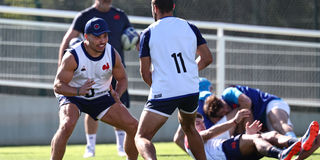Prime
France seek glory with Dupont the spark

France scrum-half Antoine Dupont (L) takes part in a training session at the Stade du Parc in Rueil-Malamaison, near Paris. PHOTO/AFP
What you need to know:
The time seems ripe for France, however, with Dupont key to a resurgence under coach Fabien Galthie, who has employed eye-pleasing tactics based around free-running backs and a disciplined pack.
Dynamic scrum-half Antoine Dupont will lead France into a home Rugby World Cup with hopes high that he can spark a first Northern Hemisphere victory in 20 years in the sport’s quadrennial showpiece.
The last team from the Six Nations to win the Webb Ellis Trophy was England in 2003, when an extra-time drop-goal by Jonny Wilkinson sealed victory in Sydney over an Australian side coached by Eddie Jones.
Since then, the trophy has remained firmly in the South Hemisphere: South Africa won in 2007 and 2019, while New Zealand triumphed in 2011 and 2015.
The time seems ripe for France, however, with Dupont key to a resurgence under coach Fabien Galthie, who has employed eye-pleasing tactics based around free-running backs and a disciplined pack.
While the loss of fly-half Romain Ntamack to injury is a blow, France boast a deep squad with a consistency in selection often missing in previous campaigns.
"We've never been so well prepared," Dupont told AFP. "We have won 80 percent of our matches and the Six Nations in 2022.
"We have a promising generation of talented players who have gained experience and continuity in the backbone of the team. That hasn't been the case over the last 10 years.
"So all systems are go. What's more, we're lucky enough to be hosting the competition, so we're hoping for public support."
The last major global sports event on French soil before next year’s Paris Olympics will be held in nine venues across France, which previously hosted the 2007 World Cup and also staged several matches as joint hosts of the 1991 edition.
Dream start
All eyes will be glued on a dream start to the tournament when France play the three-time world champion All Blacks at the Stade de France on Friday: it is a match-up many pundits predict could go full wheel to be the final, at the same stadium, on October 28.
A defeat for France would not spell disaster, however. New Zealand beat South Africa in the 2019 opener in Japan, but it was the Springboks who went on to beat England in the final.
The timing of the draw for the tournament, in December 2020, has been criticised because of how much rugby’s global landscape has shifted since then.
While France, ranked third in the world, and fourth-ranked New Zealand meet in Pool A, three of the top five teams in the world will face off in Pool B: top-ranked Ireland, South Africa (2nd) and Scotland (5th).
Surprisingly, Fiji (7th) are the highest ranked team in Pool C, which also features Australia (9th), Wales (10th) and Georgia (11th). Argentina (6th) and misfiring England (8th) head up Pool D, with Samoa (12th) and Japan (14th), who won all four pool games as hosts four years ago but have lost their potency.
Only the winner and runner-up from each of the four five-strong pools qualify for the knock-out phase, meaning there is little let-up for teams, especially when points for and against could prove vital in deciding who advances.
The quarter-finals also pitch qualifiers from Pool A against Pool B, on paper far stronger teams than the other side of the draw.
Fijian dark horses
For all of France’s form, they are not the current Six Nations Grand Slam champions. That accolade was last claimed by Ireland, who come into the competition as the world's number one ranked side.
Talismanic fly-half Johnny Sexton will be back to skipper Andy Farrell’s side after serving a ban for abusing referee Jaco Peyper after the Champions Cup final that La Rochelle won against Sexton’s Leinster.
Defending champions South Africa, skippered by their first Black African captain Siya Kolisi, handed out a record 35-7 defeat of New Zealand in both sides’ final warm-up match, a timely reminder that on its day Springbok rugby has few equals.
Coach Jacques Nienaber has quality oozing through his squad, from Kolisi at flanker to indefatigable scrum-half Faf de Klerk to, of course, the famed ‘bomb squad’ of replacement forwards deployed en masse in the second half of games.
While the All Blacks were last to suffer at the hands of the Boks, coach Ian Foster was blunt when asked if he thinks New Zealand can win the World Cup.
"I do. It's a well-tested group that's gone through a lot of adversity, stayed tight and found solutions," he said.
As for Australia, it is a mixed bag. Eddie Jones, back in charge of the Wallabies after leaving England, axed veteran skipper Michael Hooper and fly-half Quade Cooper and brought in a host of youngsters. He handed the captaincy to giant La Rochelle lock Will Skelton.
A tough pool awaits, much like in 2015 and 2019, when the Wallabies also played Wales and Fiji, many pundits' pick as dark horses for the tournament, notably after their historic 30-22 victory over England last month.
As for England, beaten finalists in 2019, Steve Borthwick has overseen five defeats in six matches since taking over from Jones.
Skipper Owen Farrell will miss the opening two games after being punished for a high tackle in a warm-up against Wales, while No 8 Billy Vunipola sits out Saturday's crucial match against Argentina for the same reason.
Referees will meanwhile be under intense pressure to take action against reckless head-high tackles as part of the crackdown on head injury-related shocks.





